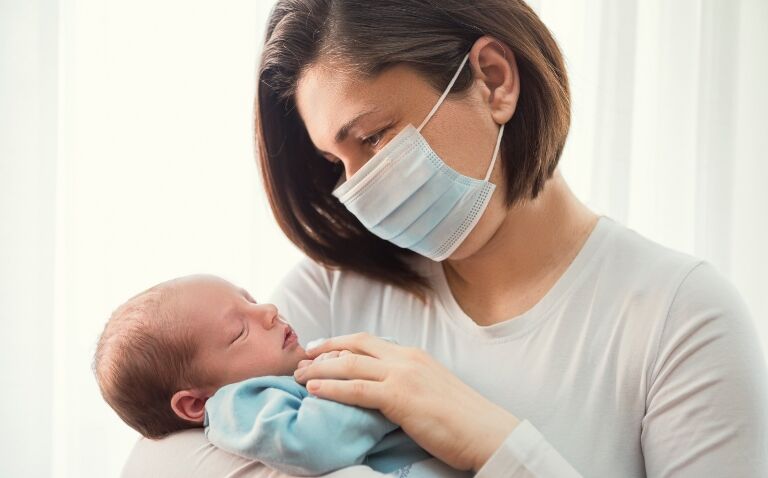The lockdowns imposed during the Covid-19 pandemic positively impacted the gut microbiome and subsequent allergy development of babies born during this time, a new study has revealed.
Researchers working in Ireland found significant differences in the gut microbiome development of babies born during lockdown periods compared to pre-pandemic babies, including lower than expected rates of allergenic conditions.
The findings, published in the journal Allergy, highlighted how environmental exposures and dietary components significantly impacted microbiota community assembly.
And they were the first to demonstrate gut health benefits arising from the unique lockdown environment, including lower rates of infection and consequent antibiotic use and increased duration of breastfeeding.
The researchers from the Royal College of Surgeons in Ireland (RCSI), Children’s Health Ireland and APC Microbiome Ireland at University College Cork collected faecal samples from 351 babies born during the first three months of the pandemic. The samples were collected at six months (n = 351) then at 12 (n = 343) using 16S sequencing.
Skin prick testing (SPT) was performed at 12 (n = 343) and 24 (n = 320) months of age, accompanied by atopic dermatitis and food allergy assessments.
In infants with atopic dermatitis, a Scoring Atopic Dermatitis (ScorAD) was calculated at 12 and 24 months and a total and objective ScorAD recorded. SPT was completed for the three most common food allergens (peanut, egg and milk) and aeroallergens (house dust mite, grass pollen and cat dander) in all infants.
Online questionnaires were used to gather epidemiological information about the babies’ diet, home environment, health and healthcare utilisation and allergic diseases, including suspected adverse food reactions and atopic dermatitis.
The pandemic-born babies were part of the CORAL (Impact of CoronaVirus Pandemic on Allergic and Autoimmune Dysregulation in Infants Born During Lockdown) project, and the results were compared with samples from pre-pandemic cohorts of babies.
Professor Liam O’Mahony, from the University of Cork and principal investigator at APC, said: ‘We took the opportunity to study gut microbiome development in infants raised during the early Covid-19 era when strict social distancing restrictions were in place, as the complexity of early life exposures was reduced and this facilitated a more accurate identification of the key early life exposures.
‘Prior to this study, it has been difficult to fully determine the relative contribution of these multiple environmental exposures and dietary factors on early life microbiome development.’
Significant differences existed in the gut microbiomes of the two cohorts. Pandemic-born babies showed a higher relative abundance of bifidobacteria at both six and 12 months, which was associated with a reduced likelihood of atopic dermatitis and positive SPT results.
Infants with elevated Bifidobacterium levels at six months of age typically exhibited fewer allergic symptoms or a lower risk of developing allergic diseases than those with lower levels of this bacteria.
The increase in bifidobacteria was linked to reduced external exposure, an increase in breastfeeding and a decrease in antibiotics during lockdown.
Social distancing was associated with delayed acquisition of horizontally transmitted spore-forming bacteria. Bacteria such as the environmentally transmitted Clostridia were found to have lower concentrations at both six and 12 months in the pandemic cohort compared with the pre-pandemic babies, correlating with the microbial exposure index.
Levels of atopic dermatitis observed in the study were not higher than expected levels. Specifically, at 12 months of age, atopic dermatitis was observed in 24.8% of participants (n=343), and at 24 months, it was observed in 19.5% (n=320).
Levels of food allergen and airborne sensitisation were also within the expected range for this age group, with SPT positivity at 7.4% at 12 months and 12.0% at 24 months.
The prevalence of allergen sensitisation, food allergy, and atopic dermatitis did not increase over pre-pandemic levels, suggesting the lockdown period did not lead to a higher incidence of allergic conditions.
Joint senior author of the study Professor Jonathan Hourihane and head of paediatrics at RCSI, added: ‘This study offers a new perspective on the impact of social isolation in early life on the gut microbiome.
‘Notably, the lower allergy rates among newborns during the lockdown could highlight the impact of lifestyle and environmental factors, such as frequent antibiotic use, on the rise of allergic diseases.’
The researchers hope to re-examine the children born during the pandemic when they are five years old to investigate whether there are longer-term health benefits arising from the early differences seen in the gut microbiome.
In August 2023, researchers found that delays in gut microbiome maturation in young children were uniformly associated with distinct allergic diagnoses at five years of age.










